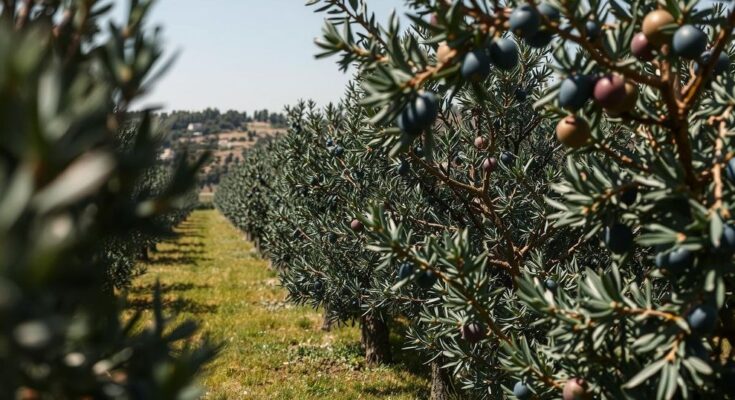The UN Human Rights Office condemned the killing of a Palestinian woman during an olive harvest, highlighting the increasing violence faced by harvesters in the West Bank. Israeli security forces have been implicated in multiple attacks and rights violations against Palestinians, while settlers disrupt the harvest efforts. The situation reflects a broader pattern of coercion, contributing to a climate of fear and displacement, demanding urgent action to uphold rights and security for Palestinians.
The UN Human Rights Office has expressed its outrage over the recent shooting death of a 59-year-old Palestinian woman during an olive harvest in Faqqu’a, Jenin. The woman was partaking in this seasonal tradition with family when Israeli security forces opened fire without warning, highlighting the increased dangers facing Palestinian harvesters during this critical time. As the olive harvest unfolds, incidents of violence and intimidation against Palestinians are alarmingly on the rise. In a worrying trend, olive picking has become fraught with peril, as organized attacks from Israeli settlers disrupt the harvest and Israeli forces impose access restrictions without cause. Notably, the olive trees of Palestinian landowners from Qusra were severely damaged amidst threats from settlers and security forces. Additionally, a violent encounter on October 5 saw many Palestinians injured and their harvest stolen, with security forces present yet unresponsive. The ongoing violence and limited land access characterize a coercive environment pushing Palestinians away from their ancestral homes. New areas of the West Bank, previously untouched by such measures, are now experiencing encroachment and harassment linked to nearby Israeli settlements. Record levels of land seizure in 2024 have increased fears that settlers, with the backing of Israeli authorities, exploit the olive harvest to consolidate their claims on the land, deepening the sense of impunity in the region. In recent days, anti-harvesting rhetoric from settler groups and government figures has heightened tensions, calling for the cessation of Palestinian harvesting. This move, masked as a security measure, poses a direct threat to the livelihoods of Palestinians who rely on the olive harvest. Israel has international legal obligations to protect Palestinians from violence and uphold their rights, as reiterated by the International Court of Justice, which deemed settler violence and the government’s failures as unlawful. The UN Human Rights Office appeals to Israeli authorities to guarantee Palestinians’ access to their land and protect them from settler violence, ensuring they can safely complete their harvest. Furthermore, there is an urgent call for thorough investigations into violent incidents and accountability for those responsible. Victims are entitled to justice and compensation per international standards, restoring hope amidst the ongoing turmoil.
The backdrop to this tragic incident is the longstanding conflict in the occupied Palestinian territories, where the olive harvest, an important cultural and economic activity for Palestinians, increasingly takes place under threat. With a history of settler violence and restrictive policies from Israeli authorities, the olive harvest season has become a time marked by fear and hostility. The ongoing conflict involves political, historical, and social dimensions that complicate the situation, making it precarious for Palestinian communities wishing to pursue a traditional livelihood. The implications of international law, including recent rulings from the International Court of Justice, underscore the obligations Israel has towards Palestinian citizens and their land. The systematic violence faced by Palestinians during the harvest season reflects broader issues of land ownership, security, and human rights in the region, setting a grim scene for what should be a season of abundance and community.
In conclusion, the killing of a Palestinian woman during the olive harvest epitomizes the dangerous reality many Palestinians face in the occupied territories. The ongoing violence from settlers and complicity from Israeli authorities contribute to a climate of fear that undermines basic human rights. It is imperative for Israel to uphold its obligations under international law, safeguard Palestinian livelihoods, and ensure justice for victims. Without intervention, the cycle of violence and displacement will persist, threatening the very fabric of Palestinian existence.
Original Source: reliefweb.int



